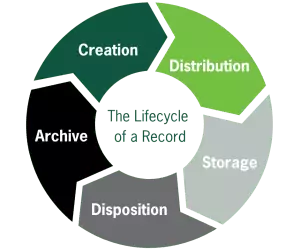During the introduction to this retention series, Are You Ready to Become an Expert on Retention Policies, we addressed that retention is a complicated subject. In our efforts to simplify this complex topic, we discovered common themes regarding various aspects of retention policy that help clarify it. One example comes from understanding how to determine the appropriate retention of an individual record or record type.
Retention policies can’t be across-the-board policies for whole industries or businesses. There are many diverse types of records within a business that require different lengths of retention and different requirements for future use. This is how individual records drive retention policy, and why policies should be understood at the level of individual record type.
Records-Driven Retention 
Now that we understand retention policies as record-driven, tailored plans designed to work with various kinds of records, we can understand how the type of record shapes the retention policy. Our consulted effort, Bill Saffidy, states that there are three factors that shape retention needs for an individual record. These details include: the record’s role as a historical document, the legal retention requirements for the document or industry, and how frequently a document might be accessed in the future.
- Historical value is the first box to check when considering the retention needs of a document. It’s not often that a business document doubles as something that should be historically preserved. There are exceptional cases and factors that can help determine historical value of a document or record. Usually, in such cases, the document will be kept indefinitely or permanently.
- The next issue that drives retention policy is legal retention requirements. Requirements enforced by a given industry, association, or governing body must be accounted for when setting retention policies for an individual document or document type. Some of these regulations can carry penalties if they aren’t followed. Most top-down retention policies enforce short retention policies in general and are often across-the-board policies like we referenced above. In other words, following legal or industry-wide enforced standards may keep you from liability to that specific governing body. However, it may NOT be enough to allow your business a functional, tailored retention policy that keeps your business relationships intact and protects your business from liability.
- Finally, we encounter the issue that has the most influence of all on setting a retention policy: How frequently will this document need to be accessed in the future? In Bill’s own words, “What records do you have, and what business functions do they support?” This means considering what purpose a given record or record type serves and understanding how long your business should hold on to that record based on when and how often it might be needed in the future. Records that serve a minor, short-term purpose may not merit lengthy retention, or any extra time beyond what is legally required. Conversely, some records might hold long-term value or be needed for future business functions. This can take some proactive effort, but it’s the kind of process that helps ensure your business employs a retention policy that makes sense and prevents exposure to unnecessary liabilities.
Retention, Simplified
Setting a retention policy for an individual record or record type is complex but understanding how these three factors work to shape retention policy simplifies the process. In summary, the process is to evaluate the document as either historically significant or not, then establish compliance with retention policies at the governmental or industry level, and finally tailor your retention policy based off the knowledge of how each type of record serves the functions of your business and its relationship with clientele.





